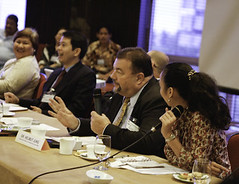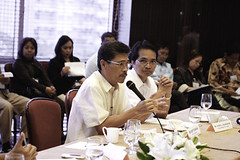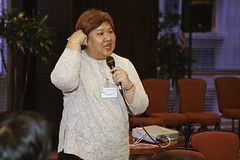First Campaigners' Media Interface - Auslandsbüro Philippinen
Event
Details
As part of the First Campaigners-Media Interface sponsored by the Konrad-Adenauer-Stiftung (KAS), Ateneo School of Government and Newsbreak, a Campaigners’ Forum on the “Trends and Developments in Philippine Electoral Campaigns” was held in the afternoon of May 13 at the Hyatt Hotel and Casino Manila.
The workshops and panel discussions were divided into three sessions/topics. Moderated by Ms. Chay Hofileña of the Ateneo de Manila University, the first delved into the “Developments and Trends in Political Opinion Research,” which featured Dr. Helmut Jung, Managing Director of the Gesellschaft für Markt- und Sozialforschung mbH (GMS), Hamburg, Germany conferring on the campaign and political trends in Germany. Dr. Jung was invited to come to the Philippines by the Konrad-Adenauer-Stiftung. He has been handling political opinion research for campaigns since the 1970s.

Moreover, there exists an apparent dichotomy between voter behavior in community elections and during state elections. People, who are dissatisfied about a federal issue turns to a local politician and demand for action in the national level. This signals the prevalence of more complex political issues that largely affected the way in which communication strategies are carried out. Now, earlier and more systematic campaigns need to be launched together with a sustained monitoring of the socio-political environment.
As such, market and opinion research has had impact in recent years however more focus must be given to quantitative and psychological research together with the urgency of exploring the impact of every word and rhetoric used in campaigning. With these, pre-testing of political ads has become a requirement.
Coming from this, Jung emphasized the significance of combining qualitative and quantitative research to reap the benefits of obtaining more profound insights. Furthermore, communication strategies must be directed on the relevant and important issues of economy, education, crime and terrorism and stagnation due to bureaucracy.
Meanwhile, the following session, facilitated by Ms. Glenda Gloria, Chief Operating Officer of the ABS-CBN News Channel (ANC), talked about “Preparing a Candidate” focusing on a candidate’s preparations for his campaign as well as the techniques he uses for a successful candidacy.
Among the discussants were: Rep. Glenn Chong of the Lone District of Biliran, Ms. Yoly Villanueva Ong, President and CEO of Campaigns and Grey, Mr. Averell Laquindanum, Campaign Manager of Pampanga Governor Ed Panlilio and Mr. Raffy Baraan, Provincial Administrator of Pangasinan.
Chong shared the focal points of his campaign in 2007 centering on the challenges he faced brought about by the opposition of the Espina dynasty. His simplistic message concentrated on the two major issues plaguing the people of Biliran at that time: murder and corruption. Moreover, he narrated his campaign strategies: how his financial and organizational limitations did not dissuade him from launching a full campaign; his clustering strategy instead of touring all barangays; his very visual campaign documentary and his establishment of volunteers’ group.
In the meantime, Ms. Ong tackled the five basic elements in running a campaign. These elements include: (1) the candidate; (2) a winning strategy crafted from a realistic assessment; (3) the key message; (4) finances and organization and (5) campaign plan.
On the other hand, Mr. Laquindanum narrated the colorful campaign story of the priest turned Pampanga Governor Ed Panlilio.

The third session focused on answering the question in the context of Philippine campaigns, “Are we moving forward or still traditional?
Among the guest speakers who offered their responses to the question were: Atty. Florencio ‘Butch’ Abad, Member, National Executive Council, Liberal Party; Mr. Francis Manglapus, Vice President for Christian-Muslim Concerns LAKAS-CMD, and Ms. Malou Tiquia, Founder and General Manager Publicus. The discussion was moderated by Ms. Miriam Grace Go, Assistant Managing Editor of Newsbreak.
According to Abad, the Philippine electoral process remains to be both traditional and modernizing as our electoral terrain reflects our political and economic condition. Moreover, his observation of the campaign of Senator Noynoy Aquino noted that a voter behaves differently in the local and national election levels.
Primarily agreeing with Abad, Manglapus also believed that the electoral situation is “double-bladed.” He said that the Philippine electoral process will not move forward unless there is change in the institutional structures. Moreover, it will remain as it is if party and political reform do not take a turn since the 1986 example.

Open forums were held after each session to gain new insights from the audience.


